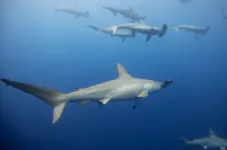(Press-News.org) Homo species – particularly Homo sapiens – were uniquely equipped to adapt to highly diverse environmental conditions and landscape mosaics, according to a new study, which may have enabled our species and that of our closely related ancestors to survive and thrive in highly fluctuating Pleistocene environments. Homo sapiens are the only surviving hominin species today. However, whether this is because our species was uniquely successful at adapting to Pleistocene environments, because we outcompeted other contemporary Homo species through unique physiological or social adaptations, or because we simply outlived others by chance remains largely unknown. Although challenging to understand, the connection between hominins and their ecological environment, particularly how Homo species adapted to environmental change and extremes and how this affected survival and migration from Africa and into Eurasia, is central to findings these answers. Combining a transient 3-million-year Earth system-biome model simulation (BIOME4) with archaeological and fossil data for 6 different Homo species, Elke Zeller and colleagues investigated the preferred environmental conditions of the different hominin species, whether biome preferences changes in time or diversity across the Pleistocene, and how these choices affected hominin adaptation. Zeller et al.'s analysis shows that early African hominins, including H. habilis and H. ergaster, predominantly lived in open and dry grassland environments. H. erectus, upon leaving the African continent, settled in a much more broad suite of environments, including temperate forested regions. This trend continued for more recent species, like H. erectus and H. neanderthalensis, who were able to adapt to colder habitats. According to the findings, H. sapiens were able to occupy the most extreme environments, such as deserts and tundra, an ability that suggests the development of unparalleled cognitive abilities, allowing them to exploit habitat diversity and diverse food resources. Overall, the study reveals a pattern of Homo species preferentially selecting and adapting to areas with more diverse habitats over the last 3 million years.
END
Earth system modeling and fossil data reveal Homo adaptation to diverse environments
Summary author: Walter Beckwith
2023-05-11
ELSE PRESS RELEASES FROM THIS DATE:
A better route to benzocyclobutenes, sought-after buildingblocks for drugs
2023-05-11
LA JOLLA, CA— Scripps Research chemists have solved a long-standing problem in the field of pharmaceutical chemistry with a relatively simple and controllable method for making benzocyclobutenes (BCBs)—a class of reactive compounds that are highly valued as building blocks for drug molecules, but have been relatively hard to access.
The new method, described in a paper in Science on May 12, uses designer ligand molecules with palladium-atom catalysts to break pairs of adjacent methylene-type C-H bonds in relatively cheap and abundant carboxylic acids. Breaking these bonds enables the making ...
Researchers discover twisted fields around mysterious fast radio burst
2023-05-11
Fast Radio Bursts (FRBs) are the brightest millisecond-duration cosmic explosions in radio bands. Their unknown origin poses challenges for astronomy as well as physics.
The Commensal Radio Astronomy FAST Survey (CRAFTS), a key program of the Five-hundred-meter Spherical radio Telescope (FAST), discovered the world's first persistently active repeating FRB, known as FRB 20190520B. Now this FRB has provided clues that may help clarify the origin of FRBs.
An international team led by Dr. LI Di from the National Astronomical Observatories of the Chinese Academy of Sciences (NAOC) carried out a monitoring campaign of FRB 20190520B, using the Parkes telescope in Australia and ...
U.S. Fishing Policy is Boosting Fish Populations, Not Constraining Most Fisheries
2023-05-11
Commercial fishing employs 1.2 million Americans and generates more than $165 billion annually. Yet warming waters are threatening fish populations and disrupting fisheries around the world—a challenge set to worsen as climate change advances. Despite the importance of sustaining fisheries, the reauthorization of the cornerstone policy protecting them in the United States—the Magnuson-Stevens Act—has been stalled in Congress for a decade. The holdup? Some blame the policy for being too stringent and leading to what they call “underfishing,” while others ...
Human ancestors preferred mosaic landscapes and high ecosystem diversity
2023-05-11
A new study published in the journal Science by an international team finds that early human species adapted to mosaic landscapes and diverse food resources, which would have increased our ancestor’s resilience to past shifts in climate.
Our genus Homo evolved over the past 3 million years – a period of increasing warm/cold climate fluctuations. How early human species have adapted to the intensification of climate extremes, ice ages, and large-scale shifts in landscapes and vegetation remains elusive. ...
Hammerhead sharks hold their breath on deep water hunts to stay warm
2023-05-11
Scalloped hammerhead sharks hold their breath to keep their bodies warm during deep dives into cold water where they hunt prey such as deep sea squids. This discovery, published today in Science by University of Hawai‘i at Mānoa researchers, provides important new insights into the physiology and ecology of a species that serves as an important link between the deep and shallow water habitats.
“This was a complete surprise!” said Mark Royer, lead author and researcher with the Shark Research Group at the Hawai‘i Institute of Marine Biology (HIMB) in the UH Mānoa School of ...
The feeling of hunger itself may slow aging in flies
2023-05-11
From low-carb to intermittent fasting, surgery to Ozempic—people turn to a seemingly never-ending array of diets, procedures and drugs to lose weight. While it has been long understood that limiting the amount of food eaten can promote healthy aging in a wide range of animals, including humans, a new study from University of Michigan has revealed that the feeling of hunger itself may be enough to slow aging.
Previous research has demonstrated that even the taste and smell of food can reverse the beneficial, life-extending effects of diet restriction, even without its consumption.
These intriguing findings drove first author Kristy Weaver, Ph.D., principal investigator ...
Nature is changing as land abandonment increases
2023-05-11
When people leave their rural lives behind to seek their fortunes in the city or agriculture is no longer profitable, the lands they toiled on are often left unused. A new perspective piece in Science shows that these abandoned lands could be both an opportunity and a threat for biodiversity, and highlights why abandoned lands are critical in the assessment of global restoration and conservation targets.
The past 50 years have seen an increased exodus of populations from rural to urban areas. Today, 55% ...
First-of-its-kind measurement of the Universe’s expansion rate weighs in on a longstanding debate in physics and astronomy
2023-05-11
Thanks to data from a magnified, multiply imaged supernova, a team led by University of Minnesota Twin Cities researchers has successfully used a first-of-its-kind technique to measure the expansion rate of the Universe. Their data provide insight into a longstanding debate in the field and could help scientists more accurately determine the Universe’s age and better understand the cosmos.
The work is divided into two papers, respectively published in Science, one of the world’s top peer-reviewed academic journals, and The Astrophysical Journal, a peer-reviewed scientific journal of astrophysics and astronomy.
In astronomy, there are two precise ...
Historic achievement for international penile cancer trial--100 patients enrolled thus far, the most ever to a prospective study for treatment of an extremely rare disease
2023-05-11
Cancer of the penis is not a subject that comes up in conversation. When it does, one common response is, “I didn’t know you could get cancer there.” Not only is it not spoken about, but it is also rare, with fewer than one case per 100,000 men diagnosed in developed countries like the United States and the United Kingdom per year. That rarity has meant far fewer clinical trials have been developed and conducted to guide its treatment, and in most cases, only small numbers of patients have been included. Fortunately, researchers from both sides ...
Getting active, while living with a partial spinal cord injury
2023-05-11
A UBC Okanagan researcher has been testing the effectiveness of a mobile app that encourages people living with a spinal cord injury—but can walk—to get active.
Dr. Sarah Lawrason, a researcher in the School of Health and Exercise Sciences, has focused her career on working with people who live with a spinal cord injury (SCI) but are ambulatory. She describes this population as an isolated, often misunderstood group of people because while they live with an SCI, they may not rely on a wheelchair all of the time for mobility.
“When people think of someone with an SCI, they picture a ...
LAST 30 PRESS RELEASES:
Cannabis compounds show promise in fighting fatty liver disease
Study in mice reveals the brain circuits behind why we help others
Online forum to explore how organic carbon amendments can improve soil health while storing carbon
Turning agricultural plastic waste into valuable chemicals with biochar catalysts
Hidden viral networks in soil microplastics may shape the future of sustainable agriculture
Americans don’t just fear driverless cars will crash — they fear mass job losses
Mayo Clinic researchers find combination therapy reduces effects of ‘zombie cells’ in diabetic kidney disease
Preventing breast cancer resistance to CDK4/6 inhibitors using genomic findings
Carbon nanotube fiber ‘textile’ heaters could help industry electrify high-temperature gas heating
Improving your biological age gap is associated with better brain health
Learning makes brain cells work together, not apart
Engineers improve infrared devices using century-old materials
Physicists mathematically create the first ‘ideal glass’
Microbe exposure may not protect against developing allergic disease
Forest damage in Europe to rise by around 20% by 2100 even if warming is limited to 2°C
Rapid population growth helped koala’s recovery from severe genetic bottleneck
CAR-expressing astrocytes target and clear amyloid-β in mouse model of Alzheimer’s disease
Unique Rubisco subunit boosts carbon assimilation in land plants
Climate change will drive increasing forest disturbances across Europe throughout the next century
Enhanced brain cells clear away dementia-related proteins
This odd little plant could help turbocharge crop yields
Flipped chromosomal segments drive natural selection
Whole-genome study of koalas transforms how we understand genetic risk in endangered species
Worcester Polytechnic Institute identifies new tool for predicting Alzheimer’s disease
HSS studies highlight advantages of osseointegration for people with an amputation
Buck Institute launches Healthspan Horizons to turn long-term health data into Actionable healthspan insights
University of Ottawa Heart Institute, the University of Ottawa and McGill University launch ARCHIMEDES to advance health research in Canada
The world’s largest brain research prize awarded for groundbreaking discoveries on how we sense touch and pain
Magnetofluids help to overcome challenges in left atrial appendage occlusion
Brain-clearing cells offer clues to slowing Alzheimer’s disease progression
[Press-News.org] Earth system modeling and fossil data reveal Homo adaptation to diverse environmentsSummary author: Walter Beckwith





